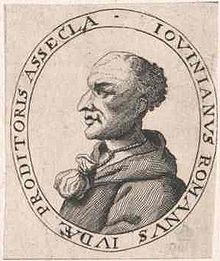Jovinian
Jovinian , Latin Jovinianus (* 4th century; † around 405), was an early Christian monk and theological writer who attacked church ascetics and was therefore condemned as a false teacher in Milan in 390 . His person and doctrine are mainly known from the polemical treatise Adversus Iovinianum by Hieronymus directed against him . His home was probably Italy , maybe Rome .
requirements
At the turn of the fourth century, parallel with the end of the persecution of Christians in the Roman Empire and the beginning of privileges, the old ascetic tendencies of Christianity had found a radical shape in the hermit monasticism. Jovinian chose this way of life and, as far as is known, kept it throughout his life.
At the same time, the doctrine had become general in the church that a form of life was all the more meritorious and closer to the kingdom of heaven , the more restriction of natural desire it required of man. Adherence to the evangelical counsels of chastity , poverty and obedience was not imposed on everyone by the church - as was demanded by Montanism and other enthusiastic currents - but it was regarded as the safer and more valuable way to God compared to a life in marriage and in material care . Jovinian rejected this different assessment.
Teaching Jovinians
Jovinian's concern was the fundamental equality of chastity and marriage, fasting and grateful indulgence , voluntary poverty and responsible wealth . Through baptism human sinfulness is healed once and for all and in all, so that all are equally close to God and do not need any further progress towards him, but only a preservation of the grace that has been obtained. This preservation is equally possible in the various forms of life.
His rejection of belief in the everlasting virginity of Our Lady even during and after birth, which he justified by referring to the brothers and sisters of Jesus mentioned in the New Testament, was closely related to this .
Jovinian found followers with his views, some of whom are known by name from the conviction files.
controversy
The Roman senator Pammachius , a Christian and childhood friend of Hieronymus, sent Jovinian's writings to him with the request to judge them. Jerome then wrote a two-volume refutation, which is kept in a sharp and personally hurtful tone. He calls Jovinian an epicurus of Christianity and assumes that he is in favor of any debauchery. He describes bodily abstinence as communion with the cross of Christ and participation in his work of redemption, but in his zeal he goes so far as to deny marriage in fact its positive value in God's plan of salvation and in the life of the church.
Pammachius was repulsed by the tone and content of Jerome's writing and tried - in vain - to prevent its spread.
Condemnation
Pope Siricius and a synod assembled by Ambrose in Milan condemned Jovinianus as a false teacher in 390 and excluded him from the ecclesiastical community. For them, his teaching meant that Christian discipline was reduced to inwardness and invisibility. They understood the grace of baptism as enabling a “meritorious” advance on the path to God. It was in this that they saw the essence of church life.
Hieronymus' Contra Vigilantium contains a remark about Jovinian which suggests that he was no longer alive at the time of writing (409).
literature
- August Neander : General History of the Christian Religion and Church. Volume 2, Hamburg 1829, pp. 574-589 ( digitized version )
- David G. Hunter: Rereading the Jovinianist Controversy: Asceticism and Clerical Authority in Late Ancient Christianity, in: Dale B. Martin, Patricia Cox Miller (Ed.): The Cultural Turn in Late Ancient Studies, Durham, London 2005, p. 119 -135.
- Ludwig Schade: Defense letter to Pammachius . In: Introduction to the letters of Jerome. In: The holy church father Eusebius Hieronymus selected letters. Kempten; Munich: J. Kösel: F. Pustet, 1936–1937; Pp. 147–151 ( digitized version )
- Philip Schaff: History of the Christian Church. Volume III: Nicene and Post-Nicene Christianity. AD 311-600. § 46. Opposition to Monasticism. Jovinian. (English, digitized version )
- Jovinianus. In: Catholic Encyclopedia. (English)
| personal data | |
|---|---|
| SURNAME | Jovinian |
| ALTERNATIVE NAMES | Jovinianus |
| BRIEF DESCRIPTION | Moral theologian, monk and writer |
| DATE OF BIRTH | 4th century |
| DATE OF DEATH | at 405 |
